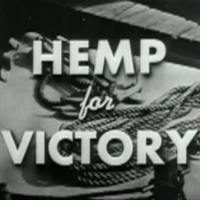California Legalizes Growing Hemp, but Waits for Federal Blessing

In yet another sign to supporters of legalized marijuana that the object of their desire is tantalizingly close, yet, oh, so far, Governor Jerry Brown signed legislation permitting farmers to grow hemp, the widely misunderstood, nonintoxicating cousin of pot.
But Senate Bill 556 only takes effect once the federal government quits enforcing the law that forbids growing, possessing and selling cannabis in any form. The feds are in the process of loosening their control in some parts of the country—Colorado harvested its first hemp crop a couple weeks ago—but not every state can try to partake.
One stumbling block may be the federal law’s requirement that a state possess “strong and effective regulatory and enforcement systems.” The federal government was none too impressed with California’s effort at regulating medical marijuana and, while some argued that shouldn’t have been cause for the U.S. Attorneys to run roughshod over dispensaries the past few years, it’s hard to ignore the chaotic nature of the rollout.
SB 556 establishes a framework for oversight and enforcement of the law through the California Department of Food and Agriculture (CDFA) and county agricultural commissioners in an arrangement that mirrors the handling of other crops.
Hemp has been demonized in the United States since passage of the “Marijuana Tax Act of 1937” effectively ended its use amid a campaign of distortion that left its storied history barely known in this country.
Hemp is one of the world’s oldest cultivated plants, dating back 12,000 years. It’s a hardy crop with a broad range of uses, including food, medicine, paper, clothing, biodegradable plastic and fuel. Hemp fibers can be used in clothing, furniture, jewelry and building materials. Oil from its seeds can be used in cooking, painting and plastics. The plant can be used for weed control.
Hemp was a dominant crop in colonial America and continued its dominance into the 19th Century. George Washington and Thomas Jefferson grew hemp. The end of slavery made the labor-intensive crop a bit less popular, but industrialization gave it a boost. Hemp was still a viable product when it was swept up in the anti-marijuana fervor of the 1930s and included in the law that levied a stiff tax on its sale.
Industrial hemp is believed by some to have been a victim of its own varied success and the plotting of others. The crop presented competition to timber, petrochemicals and an array of commodities, which meant William Randolph Hearst, the Du Ponts and Andrew Mellon were probably not among its biggest fans. Although people can’t get high from industrial hemp, its detractors lumped it with its cannabis cousin and buried it in a “marijuana madness” campaign.
Part of the 1937 tax act was found unconstitutional in 1967, and Congress repealed it three years later in favor of a new law, the Controlled Substances Act, which made all cannabis effectively illegal.
Hemp is legal in around 30 countries, including Canada, Germany, Netherlands, Romania, Japan and China. Some estimate that the global market for hemp consists of more than 25,000 products.
Hemp and certain hemp products are allowed in this country under specific circumstances. The Hemp Industries Association (HIA) estimates that the total U.S. retail value of hemp products in 2012 was almost $500 million, including food and body products, clothing, auto parts and building materials.
Nine states besides California have passed laws that have them poised to reintroduce hemp to the fields and test the market. They are just waiting for the word from Washington.
–Ken Broder
To Learn More:
Industrial Hemp Is Legal in California (by Reed Nelson, San Francisco Chronicle)
New Law Allows Industrial Hemp Crops in State (by Joe Garofoli, San Francisco Chronicle)
Governor Signs Senator Leno’s Industrial Hemp Bill (by State Senator Mark Leno)
America's First Hemp Crop Harvest in Almost 60 Years Begins in Colorado (by Matt Ferner, Huffington Post)
Hemp History (Global Hemp)
Hemp as an Agricultural Commodity (Congressional Research Service) (pdf)
Hidden Benefit of Legal Marijuana: Hemp (by David Wallechinsky, AllGov)
- Top Stories
- Controversies
- Where is the Money Going?
- California and the Nation
- Appointments and Resignations
- Unusual News
- Latest News
- California Forbids U.S. Immigration Agents from Pretending to be Police
- California Lawmakers Urged to Strip “Self-Dealing” Tax Board of Its Duties
- Big Oil’s Grip on California
- Santa Cruz Police See Homeland Security Betrayal in Use of Gang Roundup as Cover for Immigration Raid
- Oil Companies Face Deadline to Stop Polluting California Groundwater





